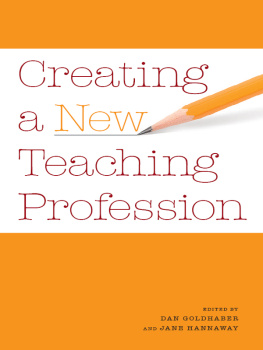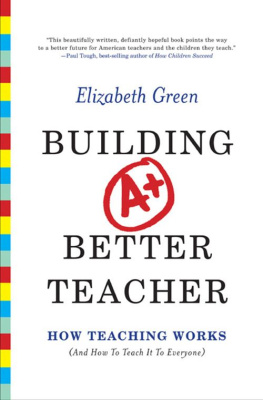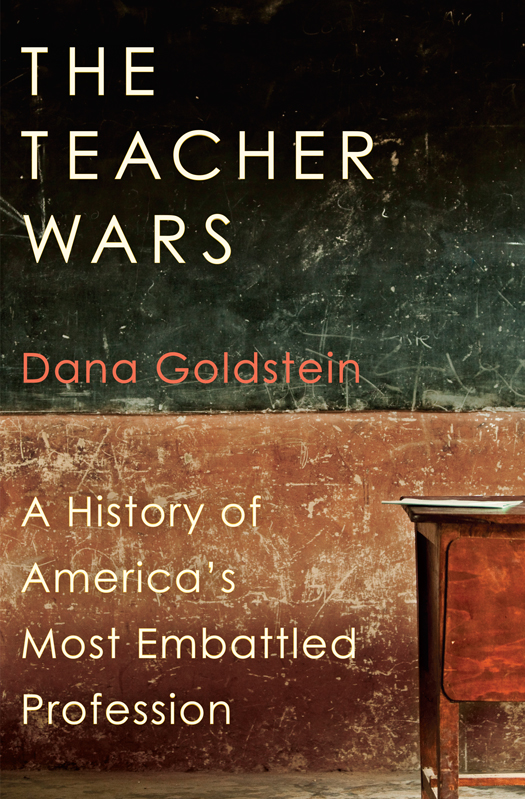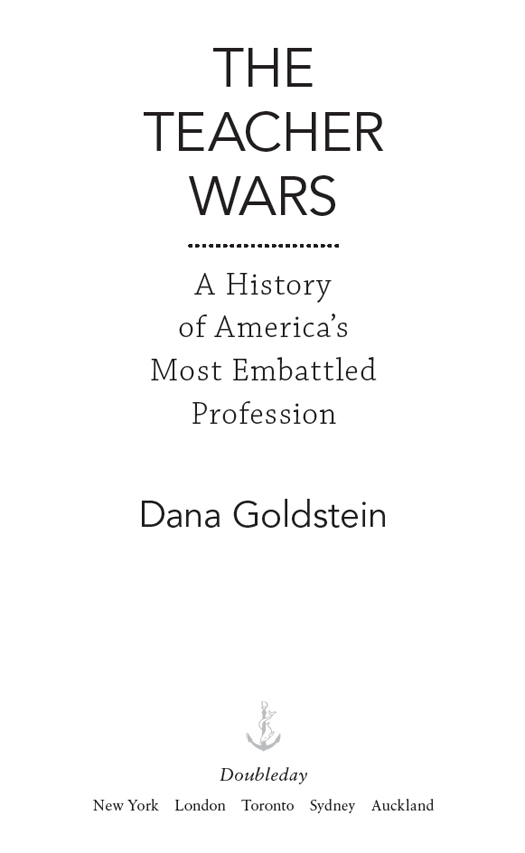Copyright 2014 by Dana Goldstein
All rights reserved. Published in the United States by Doubleday, a division of Random House LLC, New York, and in Canada by Random House of Canada Limited, Toronto,
Penguin Random House companies.
www.doubleday.com
DOUBLEDAY and the portrayal of an anchor with a dolphin are registered trademarks of Random House LLC.
Some reporting in originally appeared in The American Prospect, Slate, The Daily Beast,
The Nation, and Zcalo Public Square.
Jacket design by Emily Mahon
Jacket photograph iHennigs / Ignacio Hennigs / Getty Images
Library of Congress Cataloging-in-Publication Data
Goldstein, Dana.
The teacher wars : a history of Americas most embattled profession /
Dana Goldstein.First edition.
pages cm
ISBN 978-0-385-53695-0 (hardcover)ISBN 978-0-385-53696-7 (eBook)
1. TeachingUnited StatesHistory. 2. TeachersProfessional relationshipsUnited StatesHistory. 3. Public schoolsUnited StatesHistory.
4. Educational changeUnited StatesHistory. I. Title.
LA212.G65 2014
371.1020973dc23 2014007024
v3.1
To my parents,
Laura Greene and Steven Goldstein
It is advisable that the teacher should understand, and even be able to criticize, the general principles upon which the whole educational system is formed and administered. He is not like a private soldier in an army, expected merely to obey, or like a cog in a wheel, expected merely to respond to and transmit external energy; he must be an intelligent medium of action.
JOHN DEWEY, 1895
Contents
CHAPTER ONE
Missionary Teachers: The Common Schools Movement and the Feminization of American Teaching
CHAPTER TWO
Repressed Indignation: The Feminist Challenge to American Education
CHAPTER THREE
No Shirking, No Skulking: Black Teachers and Racial Uplift After the Civil War
CHAPTER FOUR
School Maams as Lobbyists: The Birth of Teachers Unions and the Battle Between Progressive Pedagogy and School Efficiency
CHAPTER FIVE
An Orgy of Investigation: Witch Hunts and Social Movement Unionism During the Wars
CHAPTER SIX
The Only Valid Passport from Poverty: The Great Expectations of Great Society Teachers
CHAPTER SEVEN
We Both Got Militant: Union Teachers Versus Black Power During the Era of Community Control
CHAPTER EIGHT
Very Disillusioned: How Teacher Accountability Displaced Desegregation and Local Control
CHAPTER NINE
Big, Measurable Goals: A Data-Driven Vision for Millennial Teaching
CHAPTER TEN
Let Me Use What I Know: Reforming Education by Empowering Teachers
EPILOGUE
Lessons from History for Improving Teaching Today
Introduction
I began this book in early 2011 with a simple observation: Public school teaching had become the most controversial profession in America. Republican governors in Wisconsin, Ohio, and Indiana, and even the Democratic governor of deep blue Massachusetts, sought to diminish or eliminate teachers rights to collectively bargain. Teacher tenure was the subject of heated debate in statehouses from Denver to Tallahassee, and President Obama swore in his State of the Union address to stop making excuses for bad teachers. One rising-star Republican, New Jersey governor Chris Christie, even became a conservative folk hero after appearing in a series of YouTube videos in which he excoriated individual public school teachersall of them middle-aged womenwho rose at public events to challenge him on his $1 billion in education budget cuts, even as he cut $1.6 billion in corporate taxes.
No other profession operates under this level of political scrutiny, not even those, like policing or social work, that are also tasked with public welfare and are paid for with public funds. In 2010 Newsweek published a cover story called The Key to Saving American Education. The image was of a blackboard, with a single phrase chalked over and over again in a childs loopy handwriting: We must fire bad teachers. We must fire bad teachers. We must fire bad teachers. Wide-release movies like Waiting for Superman and Wont Back Down, funded by philanthropists who made their fortunes in the private sector, portray teacher tenure and its defender, teachers unions, as practically the sole causes of underperforming schools. Everywhere I traveled as a reporter, from the 2008 Democratic National Convention to the 2010 meeting of former president Bill Clintons Clinton Global Initiative, powerful people seemed to feel indignant about the incompetence and job security of public school teachers, despite polls showing that the American public considers teachers highly respected professionals, nearly on par with medical doctors.
Anxiety about bad teaching is understandable. Teachers do work that is both personal and political. They care for and educate our children, for whom we feel a fierce and loyal love. And they prepare our nations citizens and workers, whose wisdom and level of skill will shape our collective future. Given that teachers shoulder such an awesome responsibility, it makes sense that American politics is acutely attuned to their shortcomings. So I want to begin by acknowledging: It is true that the majority of American teachers have academically mediocre backgrounds. Most have below-average SAT scores and graduate from nonselective colleges and universities.Another study of over a thousand urban public school classrooms found only a third of teachers conducting lessons that developed intellectual depth beyond rote learning.
In the Obama era, the predominant policy response to these very real problems has been a narrow one: to weaken teachers tenure protections and then use measures of student learninga euphemism for childrens scores on an ever-expanding battery of hastily designed teststo identify and fire bad teachers. One Colorado teacher told me (hyperbolically) that the disproportionate focus on punishing awful teachers made her feel Ive chosen a profession that, in the public eye, is worse than prostitution. A spate of online videos and blog posts, in which angry teachers publicly quit their jobs, has gone viral. I can no longer cooperate with a testing regime that I believe is suffocating creativity and innovation in the classroom, wrote Ron Maggiano, a Virginia high school social studies teacher and winner of two national teaching awards. In Illinois, Ellie Rubinstein tendered her resignation via YouTube, explaining, Everything I loved about teaching is extinct. Curriculum is mandated. Minutes spent teaching subjects are audited. Schedules are dictated by administrators. The classroom teacher is no longer trusted or in control of what, when, or how she teaches. Olivia Blanchard chose to leave her Teach for America placement in Atlanta, where hundreds of thousands of dollars in merit pay bonuses had been paid to administrators and teachers who cheated by erasing and correcting students answers on standardized tests before submitting them to be graded. After a round of indictments, those teachers who remained in the district were left demoralized and paranoid. When Blanchard clicked Send on her resignation e-mail, she was flooded with relief, she recounted in The Atlantic.
Blanchard, Maggiano, and Rubinstein represent a larger trend. Polls show teachers feel more passionate and mission-driven about their careers than other American professionals. But a MetLife survey of teachers found that between 2008 and 2012, the proportion who reported being very satisfied with their current job plummeted from 62 to 39 percent, the lowest level in a quarter century.







